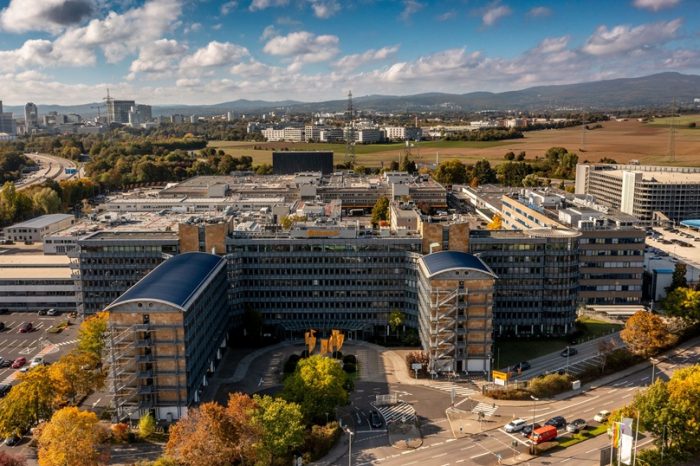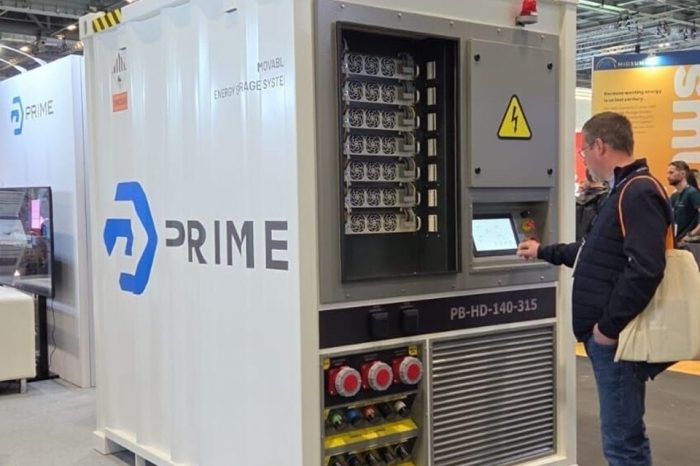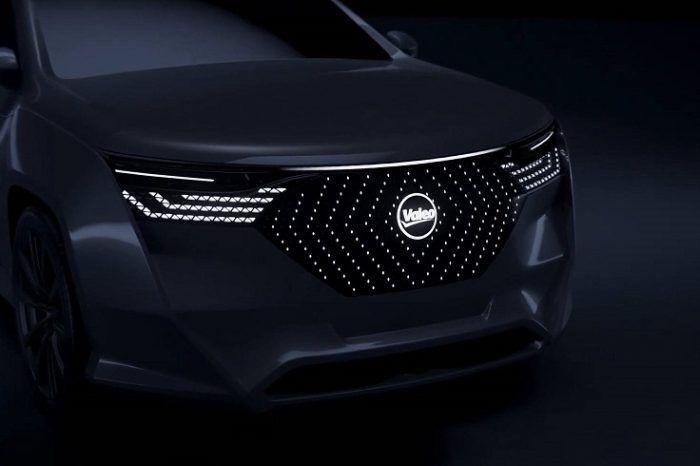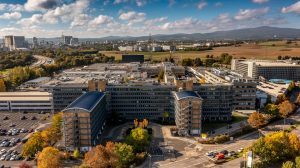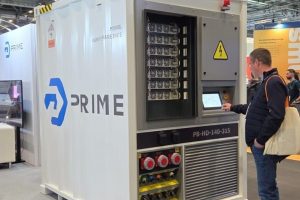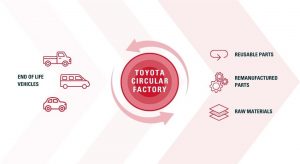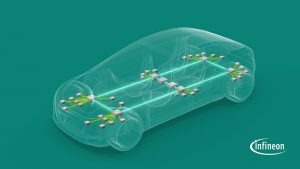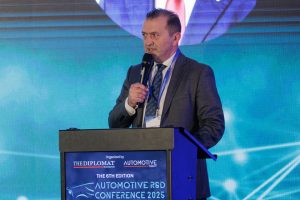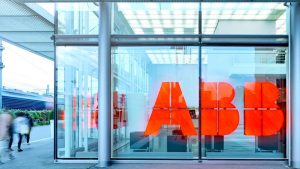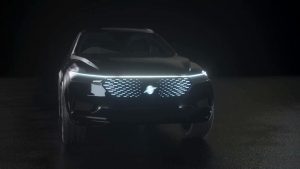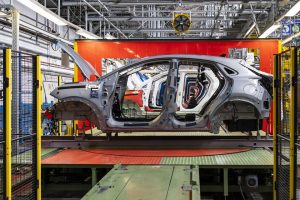INTERVIEW Tobias Matter, Bosch Engineering Center Cluj: How is Bosch preparing for the changes in the automotive industry
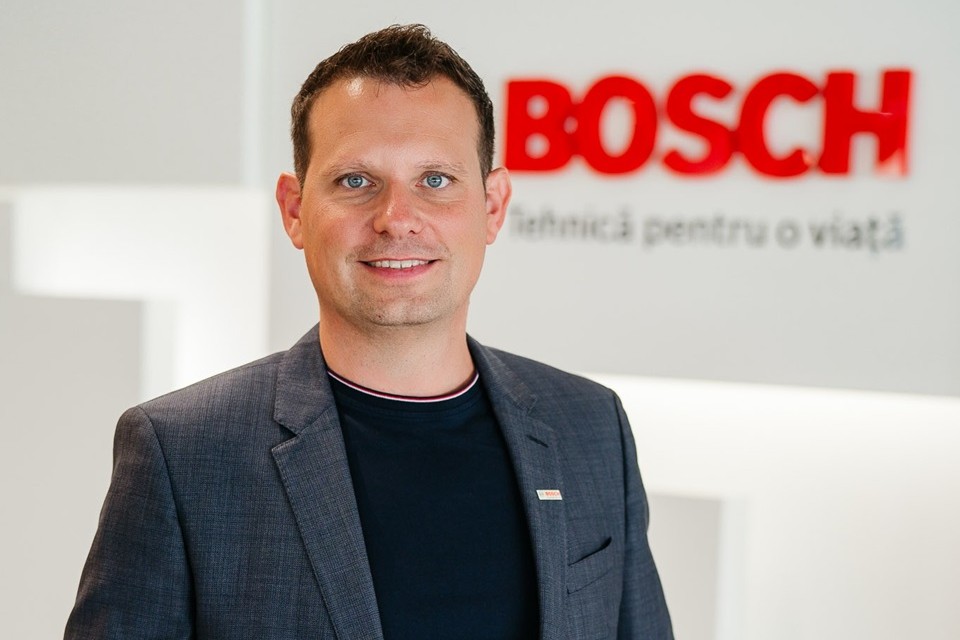
“In the near future, we think that the combustion engine will still be relevant. But of course, the focus of the industry, and ours at Bosch, is for these new and environmentally friendly solutions. We must ready ourselves for the corresponding EU legislation regarding combustion engines to answer the short-term demand, and I have to say that Bosch supports the new Euro 7 pollutant standards to improve air quality. But the future is green, and that is what we aim to improve,” Tobias Matter, Head of Bosch Engineering Center Cluj told Automotive Today.
“The Engineering Center in Cluj is part of the Bosch global engineering network, and we are developing software solutions for the electric car sector, for control units and battery management, EV fleet management. We provide embedded and cloud-based services to increase battery performance and lifetime, and other data engineering solutions for the automotive industry. At the same time, we are developing and testing software and solutions for the Fuel Cell Control Unit for hydrogen powertrain system.”
The automotive industry is transforming. How is Bosch preparing for this new era and how challenging do you think it will be?
There are some key trends in the automotive industry’s transformation that lead to greater safety and efficiency on the roads, and Bosch is responding to this transformation process with the biggest realignment of its core business in the company’s history. An important advantage we have is that, at Bosch, we feel equally at home in both the software and hardware domains. Whether it’s brakes, steering systems, or eco-friendly propulsion systems – where Bosch pursues a technologically neutral approach with fuel cells, batteries, and hydrogen engines – we are a technology and services provider that develops and manufactures under the same roof the key components of modern vehicles. Currently, there are four strategic investment streams at Bosch as a response to the automotive industry’s transformation and our continuous focus on latest technologies: efficiency and ecology of the classic combustion engine, electrification – battery management and services, hydrogen for mobility – fuel cell and Hydrogen engines, from Hardware to Software-defined vehicles and vehicle automation.
This transformation process is extremely important not just from a technological perspective, but also because it is reflected in economic trends. For example, the overall market for automotive software is expected to be worth 200 billion euros by 2030, and everyone involved in the automotive industry is intensifying their software development activities – manufacturers and suppliers are redoubling their efforts, and tech players, too, are entering the market. The entire automotive industry is presently redoubling its software development work. Its share of development cost will be roughly 30 percent by 2030. At Bosch, it is already higher than that, we have some 90,000 associates in research and development, of which roughly 48,000 are software engineers.
Does the traditional internal combustion engine still have a future? Or is it clear that the alternative mobility solutions will pave the way in the next decades?
In the near future, we think that the combustion engine will still be relevant. But of course, the focus of the industry, and ours at Bosch, is for these new and environmentally friendly solutions. We must ready ourselves for the corresponding EU legislation regarding the combustion engines to answer the short-term demand, and I have to say that Bosch supports the new Euro 7 pollutant standards to improve air quality. But the future is green, and that is what we aim to improve.
Electrification is already well advanced, particularly in the mobility sector. Bosch is a leading supplier along the entire electromobility value chain – from chips, e-axles, and electric motors to battery technology, charging stations, and numerous services. Also, we are working on new solutions and innovations that could bring further progress in this area. One great innovation that Bosch presented at CES2024 is automated valet charging. In a parking garage equipped with an automated valet parking system (also by Bosch), cars featuring this new technology can drive themselves to an available parking space furnished with a charging spot.
In addition to electrification, Bosch sees hydrogen as a key to meeting global energy demand in a resource-efficient way. The focus is currently on the mobile fuel cell, which recently went into volume production in Stuttgart. This lies at the heart of the powertrain system for heavy vehicles, and Bosch has already received its first orders from truck manufacturers in Europe, the U.S., and China.
The Engineering Center in Cluj is part of the Bosch global engineering network, and we are developing software solutions for the electric car sector, for control units and battery management, EV fleet management. We provide embedded and cloud-based services to increase battery performance and lifetime, and other data engineering solutions for the automotive industry. At the same time, we are developing and testing software and solutions for the Fuel Cell Control Unit for hydrogen powertrain system.
Another key topic in the automotive industry transformation is vehicle automation. How do you see this topic and what impact will it have on the market?
This new chapter of automotive engineering is about mastering complexity – the technical complexity of the interaction between the vehicle and cloud and the integration of software from various sources, as well as the challenging organizational and cultural complexity of collaboration between the automotive and IT industries. This requires greater interdisciplinary cooperation, including at Bosch. That’s the fundamental reason behind the reorganization of our mobility sector.
The software-defined vehicles offer two key benefits. First, incorporating new functions into existing systems will be a matter of days instead of years in the future, thanks to the significantly increased speed of development. Second, vehicles will continue to be and feel “like new” years after they are delivered to the customer – the end consumer will benefit from a “2.0 version” with just a software update that will add or improve functions. The key to this will be the decoupling of software and hardware development.
The Cluj team is highly involved in this area of development. Our activities are more than 70% software driven with a focus to increase vehicle automation. For example, we develop advanced driver assistance systems, like automated driving systems, automated and autonomous parking systems. We are the leading player in the field of artificial intelligence (AI) technology in the local automotive industry with the largest team of AI specialists in Romania.
Given that Bosch is one of the companies that brings state of the art technologies in Romania, do you think that the company will remain one of the top desired employers on the market?
For years, Bosch Engineering Center has been one of the most desired employers in Cluj among software and hardware engineers with an interest in the automotive industry.
At Bosch, we have an organizational culture that encourages the life-long learning and development process of employees, therefore they have access to a wide range of resources from traditional training to online courses, books, internal learning platforms, informal events, and much more. This way, the learning process is tailored to the needs and style of each individual employee, making the assimilation of new knowledge easier. Additionally, it is important for people passionate about technology to feel that they have a positive impact and can contribute to innovative products and services that solve real problems. And, at Bosch, they find this opportunity because all the products and solutions we develop, whether locally or globally, contribute to improving the quality of life.
Our organizational culture and leadership is based on autonomy, trust, flexibility, and continuous feedback. More than that, I believe that successful leadership in today’s transformational times, influenced also by the increased popularity and use of AI, means to be able to ensure future business. Leaders need to be able to indentify future trends and opportunities, build parterships and adopt life-long learning approach to develop themselves and their teams. This is equal in my understanding with a shift in our leadership style towards a visionary/content-based leadership style, which combines successfully innovation skills (able to diversify the business areas, exploit new business opportunities, readyness to take risks, respond to new opportunities), people management skills (connect with the team, motivate and coach team members) and business management skills (data-driven business steering, in-depth knowledge of different technologies, adaptable to change, able to manage strategic deals and alliances).
I think this is the only way that todays’ businesses remain successful in the future: if we as leaders are capable to see the value contribution of our teams to the general business success, and we can motivate each and every team member to find their way to personally contribute to the business success, while constantly training ourselves and our people with future-ready competences.


